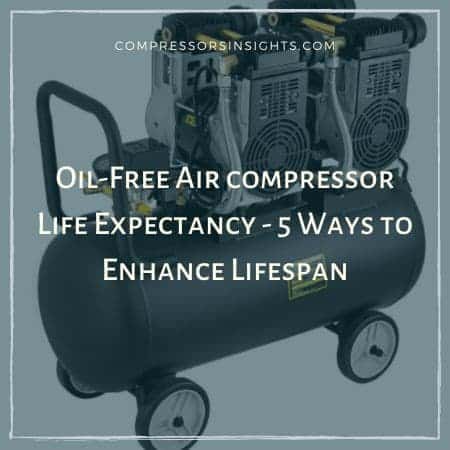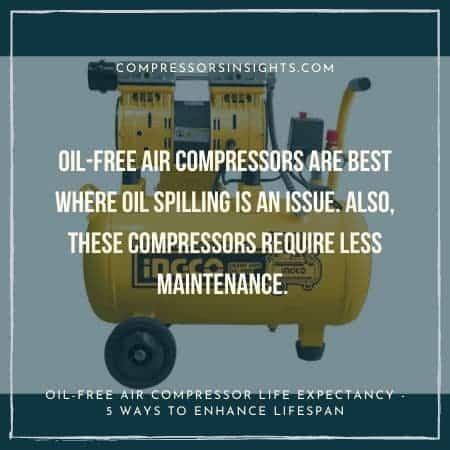Oil-Free Air compressor Life Expectancy – 5 Ways to Enhance Lifespan
TheToolGeeks.com is a participant in the Amazon Services LLC Associates Program and other affiliate advertising programs. We may earn from qualifying purchases. (Learn More).
Oil-free air compressor life expectancy is shorter than oil-lubricated air compressors but is portable and durable. Many people prefer them because they are transferable. But, still what’s the life span of an oil-free air compressor? Read this article to know in detail.
The purpose of this article is to explain the differences between oil-free and oil air compressors. How to check the quality of the oil-free compressor when choosing the oil-free compressor, and how can you maintain them to increase their lifespan?
In addition, we will talk about the pros and cons of oil-free and oiled air compressors to make your work easy to decide which one is better. Which compressor you choose depends on your needs.

What is an Oil-Free Air Compressor & How it Works?
The oil-free compressor is a lightweight and portable compressor. These compressors are maintenance-free – that means there is no need for oiling. The oil-free compressors are the best option to choose for the business and also for the house.
Some oil-free compressors offer noise-free or fewer noise compressors which the traditional compressors do not have. Additionally, these compressors do not use oil to lubricate their different parts since oil can be harmful to the environment.
Instead, the oil-free compressors use special liquids for their environmentally friendly parts. Companies that want to reduce carbon waste should consider using these compressors. The oil-free compressor can work in cold weather too.
How it Works:
The first step is air expulsion, in which the compressor draws in air, pressurizes it, and then expels it. The filtration happens in which the filters are used to eliminate the particles from the air ( ensures there will be no damage to components).
In the pressurization process, the compressor pressurizes the air, and after completing it, the compressor expels it. When the expulsion occurs, an oil-free compressor has a cooling system that cools the compressor and collects the liquid. ( it prevents rusting inside the compressor).
So, an Oil-Free air Compressor Doesn’t need oil at all, right?
No, this is not the case. Yes, the oil-free compressor does not need oil, but it is not true that they do not need oil at all. The oil-free compressor needs an oil, maybe not inside ( chamber) the compressor or fuel tank, but to make the components run smoothly. Mainly for parts which can run efficiently and smoothly!
Types of an Air Compressor
Rotary Screw Compressors
This is the most common type of compressor and the easiest one too. It is easy to maintain and comes with an internal cooling system. It is used for large-scale purposes and comes in oil- and oil-free models. This one is great for extensive and continuous use purposes!!.
Reciprocating Compressors
This compressor is one of the famous compressors found in small work sites. You can find them in garages or construction sites. This one is not for frequent and continuous use, and the parts of the compressor need oil for smooth movement.
It comes in single or multi-stage variations, affecting pressure ranges. The multi-stage compressor is excellent for higher power, and the single-stage is suitable for minor use.
Dynamic Compressors
This compressor generates high horsepowers with rotating blades, and it is stored as static energy in the compressor and has the two most common types of compressor.
Axial: This one is used for the ship’s high-end engines.
Centrifugal: It is excellent for high manufacturing and plants.
Oil-Less Compressor Vs Oiled Air Compressor
Oil-free vs oil-lubricated air compressors have the following differences:
- An oil-free compressor doesn’t use any oil in the compression process, while an oil-lubricated compressor uses a small amount of oil to help cool and lubricate the compressor’s internals.
- Oil-free compressors are typically smaller and less expensive than their oil-lubricated counterparts, but they also have shorter lifespans and are less efficient.
- An oil-free compressor is a good choice for environments where the possibility of oil spills is a concern, such as in hospitals or food processing plants.
- The two main types of air compressors are oil-free and oil-lubricated. Here’s a look at some of the key differences between the two.
- An oil-free compressor doesn’t use any oil in the compression process, while an oil-lubricated compressor uses a small amount of oil to help cool and lubricate the compressor’s internals.
- Oil-free compressors are typically smaller and less expensive than their oil-lubricated counterparts, but they also have shorter lifespans and are less efficient.
- An oil-free compressor is a good choice for environments where the possibility of oil spills is a concern, such as in hospitals or food processing plants.
- Oil-free compressors are typically smaller and less expensive than their oil-lubricated counterparts, but they also have shorter lifespans and are less efficient.
Oil-Free Air Compressor Life Expectancy
The oil-free compressors mostly last for 200 hours to 2000 hours approximately based on the quality and usage of air compressor. However, there are some factors that may increase or decrease the life span of oil-free air compressors. We’ll discuss this in this article!
The life expectancy of oil-free air compressors is shorter compared to oiled compressors. There is a Teflon coating on the compressors which will eventually wear off. That is the time most people replace their compressors.
Since the pressure takes time, it will need to work twice as long, which will result in the compressors getting heated. Eventually, the compressors will completely shut down because of overheating. These compressors have universal motors that do not last longer than induction motors.
What About Oil-Lubricated Compressors?
The oil compressors have a life expectancy of up to 15000 hours, or we can say that they last 7-times more than oil-free compressors. However, they are heavier in size and mostly not transferable.
The oiled compressor has cast iron heads, which are more durable than piston heads. You can also increase the lifespan of the compressors by taking breaks while using them to let them rest and not overheat.
Major Reason of Less Life of Oil-Free Air Compressor
The failure occurs when they start to build pressure very slowly or develop a leak in the cylinder. Also, one of the major reason is piston ring failure. Why would it fail? It fails because of bad fuel or oil quality and can also fail because of a poor combustion process or wrong oil timing.
How to know it failed? When it fails, the gas passes into the crankcase. When the piston fails, it stops protecting the leaking from going into the cylinder, leading it to mix in the combustion process.
Types of Lubrications for an Air Compressor
Mainly there are two types of lubricants for an air compressor; others are just alternatives that can be used for only temporary purposes:
Standard:
This one is less expensive than the others, and it is excellent because of its minerals. This is great for homeowners and the purpose of light or medium projects, and it is a great choice when you do not use the compressor for regular use.
Synthetic:
This oil is processed under a lot of processing and is refined. Unlike standard, this oil is excellent when professionals use the compressor. It makes the compressors run smoothly and efficiently, and it makes the compressor cool down quickly and prevents overheating.
How to Maintain Your Oil-Less Compressors For Long Life?
To enhance or maintain the lifespan of your air compressor, follow these things:
1. Inspect the Power Lead
It is necessary to keep an eye on the compressor cables because of wear and tear over time. If there is any damage you see, do not use the compressors until you fix it.
2. Tank Draining
Drain the compressors from air and moisture after every use. It will not let moisture come into the tank. It can rust the tank also. Leaving the compressor undrained will lead to the tank rotting. It can also contaminate the compressors, and the compressors will not work.
3. Pressure Check
When the pump works, you need to monitor the pressure to ensure it does not build up more. If the pressure is too high, it can damage the air compressor. Every compressor comes with the maximum PSI. Make sure to check it and do not let the PSI go overboard.
4. Keep an Eye on the Compressor Pressure
You need to observe your compressors if you want to maintain them. Make sure the pressure is building up and stopping at the right level. Any irregular behaviors can lead to damage to the compressors.
5. Keep an Eye on the Leaks
You should inspect your compressors regularly to ensure that there is no leakage happening in the compressor. The best time to check it is when the compressor is running at its max pressure.
How to Check Quality Of Air Compressor While Buying?
You do not want to buy an air compressor that is low quality and breaks down right after buying it. Follow these guidelines for finding a good one:
- Look at the weight of the product, which is to be between 50 – 60 lbs. If it’s lighter or heavier than this, there might be something wrong with it!
- Look for a compressor with two gauges, one that measures the output pressure and one that measures the input pressure.
- Make sure there is a regulator knob on the front of the machine so you can easily adjust the airflow.
- The motor should be a belt-drive type, not a direct drive. It will ensure it runs quieter and cooler.
- Make sure the compressor has an automatic shut-off switch in case of a power outage. It will help keep your machine from overheating.
- The tank should be made out of metal, not plastic. And it should have a drain valve so you can quickly empty any water that accumulates inside.
- The horsepower of the compressor should be between ¾ – one horsepower.
- The CFM rating should be between 125-150 CFM.
Oil-free Air Compressor Pros and Cons
It is lightweight, transferable.
No need for regular maintenance.
It can work in cold weather.
They do not last long.
It heats up quickly.
Is an Oil-free Air Compressor Good?
Oil-free compressors are an ideal choice because they are free of oil mess. The compressors use a piston that pushes air into the tank, which is then released when you need it.
It means there’s no risk of oil leakage or contamination. These compressors are quieter than traditional compressor models, making them ideal for use in residential settings.
Plus, they don’t require any maintenance, so you can plug them in and get to work. Most oil-free models are also very durable, which is great for people who use their tools regularly.
But But But, the major issue is oil-free air compressor are not ideal for quite environment (they are loud). So, if you’re quite person and love to work in quite environment, we recommend you to go with Oiled air compressor.

Conclusion
Oil-free air compressor life expectancy is much shorter than oiled air compressors. How long will an oil-free compressor last? The oil-free compressors last for around 16-18 months.
However, the maintenance of oil-free compressors can increase their lifespan. The maintenance includes: draining, checking leakages, and pressure checks. The oil-free compressors are lightweight and oiled compressors are heavy.
Most people prefer oil-free compressors. But it is necessary to make the best decision according to your specific needs. It’s ultimately up to you to decide what’s right for you.
FAQs
Are our oil-free compressors reliable?
Yes, they are reliable; they can last longer depending on the features of the model you are buying—monitoring and cleaning increase lifespan. However, compared to oil-lubricated, it might last for less time.
What is the average lifespan of an air compressor?
More realistically, the lifespan of the compressor can be 5-10/8-10 years. But when it is properly maintained and monitored, you can increase it from 10-15 years.
How do you maintain an oilless air compressor?
You can maintain your oil-free air compressor by following these tips:
- Regularly inspect the power lead of the compressor
- Drain the air receiver ( weekly, or after two/three days)
- Ensure pressure is stable
- There should be no leaks/damages.
- Keep observing any irregular noise.
Amazon and the Amazon logo are trademarks of Amazon.com, Inc, or its affiliates.
